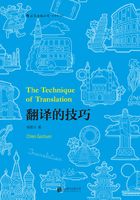
(2)用合句来翻译
所谓合句,英文叫作Compound Sentence,是由两个或两个以上的独立子句(Independent Clause)所构成的。采用这种句型来翻译的时候,实比采用单句还要来得简单,但要注意一点,子句与子句间要用对等连词(Coordinate Conjunction)来结合成为合句才是。对等连词约可分为下列四种:
(一)累积连词(Cumulative Conjunction):有and,both……and,not only……but also,no less than,as well as,furthermore,besides,moreover等。
(二)选择连词(Alternative Conjunction):有or,either……or,nor,neither……nor,otherwise,or else等。
(三)反意连词(Adversative Conjunction):有but,yet,while,nevertheless,still,however,whereas,only,notwithstanding等。
(四)推论连词(Illative Conjunction):有for,therefore,so,thus,hence,wherefore,consequently,accordingly等。
在以上的对等连词中,有的并不是真正的连词,而是接续副词(Conjunctive Adverb),又称关系副词(Relative Adverb),拿来用作对等连词的,例如:
那里没有一个人,所以我也就走了。
There was no one there,so I went away.
我们在那里呆了一个钟头就回家了。
We stayed there an hour;then we went home.
你一旦露出任何恐惧的迹象,他就会攻击你。
Once you show any sign of fear,he will attack you.
她是留学美国的,所以她英语说得好。
She is an American returned student,therefore she speaks good English.
这书一脱稿,我马上和出版家订好了出版合约。
Immediately this was done,I completed an arrangement with my publishers.
我很想去,不过我却不愿冒着雨去。
I want to go very much;still I do not care to go through the rain.
他是一个聪明人,而仍不免常犯错误。
He is a wise man,nevertheless(或none the less或and yet)he often makes mistakes.
我很愿意做,只是我太忙了。
I would do it with pleasure,only( = except that)I am too busy.
我正要说话,铃子就响了。
I was just going to speak,when the bell rang.
此外还有原是不对等的连词,如as,until,while,when等,有时也可拿来作对等连词用,例如:
他是一个美国人,我听他说话就知道。
He is an American,as I know from his accent.
在此他又犯了一般以貌取人的通病,那过后就可以证明的。
Here he fell into the common error of judging by appearances,as will be proved hereafter.
那个婴孩变得越来越虚弱,终于不久就死了。
The little baby grew more and more sickly,until presently it died.
一条轮船正用全速力在走,突然一下驶入浅水而触礁了。
A steamer was going along at full speed,when it suddenly got into shallow water and ran aground.
他正想要用脚后跟践碎那株小草,而一个新的念头使他停下来了。
He was about to crush the plant with his heel,when a new thought made him stop.
某种习惯一直在形成而牢固起来,终至变得牢不可破。
All the while a certain habit is forming and hardening,until at last we find ourselves helpless.
有的人富,有的人穷。
Some men are rich,while( = whereas)others are poor.
当我在纽约的时候,我见过他好几次。
I saw him several times while I was in New York.
我弟弟发了财,而我还依旧穷困。
I have remained poor,while my brother has made a fortune.
那帽子的颜色我虽则很喜欢,但形式我不爱。
While( = Though)I like the colour of the hat,I do not like its shape.
上面最后两例是由其前一例的基本用法逐渐引申出来的。
现将真正的对等连词的用法,例示如下:
小红低唱我吹箫。
I played on the flute,and Hsiao Hung sang to it.
他开始说话,全体肃静。
He began to speak,and all was still.
过几分钟他就睡熟了。
A few minutes more,and he lay sound asleep.
赶快,那么你就可以赶上火车。
Make haste,and you will catch the train.
他在恐怖中从家中逃走了,从那以后我再没有见到他。
He fled from the house in terror,and I have never seen him since.
你一定要把文书归档,否则你就不会受到信赖。
You must have your papers on file,or no credit will be given.
穿上你的外套,否则你会着凉的。
Put on your overcoat,or you will catch cold.
要么进来,要么出去。
Either come in or go out.
你必须说实话,或者什么也不说。
You must either tell the truth or say nothing.
强使污物留下的话,不是引起皮肤病,就是伤害血液。
Either the skin will become diseased,or the blood will be injured by being forced to retain its impurities.
赶快,否则你就要迟了。
Hurry up or else you’ll be late.
我没有钱,我也不想有钱。
I am not rich,nor do I wish to be.
既非他错,也非我错。
Neither he is mistaken nor I am.
约翰和我都没有到会。
Neither John nor I attended the meeting.
他是一个能干的人,但这问题对他也嫌太难了。
He is an able man,but the problem was too hard for him.
他的身体虚弱,但他仍要工作。
He is not in good health,but he still wants to work.
你现在必得离去,但下回你可以再来。
You must go now,but you may come again.
他不可能懒惰,因为他有很大的进步。
He cannot be idle,for he makes remarkable progress.
油完了,因为灯已熄灭。
The oil must be out,for the lamp has gone out.
林肯不但是黑人的朋友,也是弱者和无告者的朋友。
Lincoln was not only a friend of the negroes,but a friend of the weak and the helpless.
他不但给了我钱,还给了我一个装钱的皮包。
He gave me not only the money,but also a purse to put it in.
事业的成功,不但要有精力,还得有耐性。
Not only energy,but patience is necessary to success in life.
你须听话,否则你将受罚。
Do what you are told;otherwise you will be punished.
抓住那个机会,不然你将后悔。
Seize the chance,otherwise you will regret it.
有人喜欢吃肥肉,而另有人就讨厌它。
Some people like fat meat,whereas others hate it.
他很聪明而他的妹妹就有点愚笨。
He is clever whereas his sister is foolish.
总督看了请愿书,但他仍然拒绝赦免那孩子。
The governor read the petition;nevertheless he refused to pardon the boy.
他有学问又有经验。
He has experience as well as knowledge.
合句有时不用连词而用标点也是可以的,尤其在古文中常有见到,例如:
Cowards die many times before their death;The valiant never taste of death but once.(Shakespeare,Jul.Caes. II,ii,32f.)(对照意味)
John Told had drunk a large quantity of liquor,he was both merry and tipsy.(Powys)(因果关系)
Shakespeare was born in 1564;he died in 1616.(罗列一起)
A writer wants something more than money for his work:he wants permanence.(继续谈论)
而《圣经》上的合句则连词和标点都用得很多:
And the rain descended,and the floods came,and the winds blew,and beat upon that house;and it fell;and great was the fall of it.(Matt. vii. 27)
合句有时既可借用复句的不对等连词,则合句与复句岂不变得一样的而没有分别了,须知二者的分别并不全在连词,还有其他重要的因素。凡用有限制用法的关系词(Relative)的文句就是复句,用有非限制用法即继续用法的关系词(通例在其前有Comma)的文句便是合句,如:
He is the man whom I met in the train.(复)
I met Mr. A,who( = and he)told me the news.(合)
This is the place where I was born.(复)
Then my parents went to America,where( = and there)I was born.(合)
Then I went to Rome,where( = and there)I stopped for a week.(合)
This book,which( = though it)appeared about a month ago,has already gone through several editions.(复)
When at home,he shuts himself up in his study.(复)
在合句中连词的位置多半是放在两个子句之间,如:
He is young,and yet he is prudent.
I was ill,so I did not go.
I knew it was him the minute I saw him.
但是复句的连词就多半是放在附属子句之前,如:
Let us go to bed,as it is late.
Though he is poor,he is honest.
Brave as she was( = Though she was brave),she trembled.
Brave as she was( = Because she was brave),she attacked.
习题7
试用英文合句译出下列各句:
1. 日暮途远。
2. 不自由毋宁死。
3. 聪明人为求知而读书,愚人则为文凭。
4. 天将下雨,因为晴雨表渐见降低。
5. 几家欢乐几家愁。
6. 他自己家里有很多事要做,而他却来帮我的忙。
7. 他硬不肯听,要我怎样去说服他。
8. 他分明知道打扰我们,他还要说个不停。
9. 他借我五千元,只还来两千。
10. 当我对你说话的时候,请你不要作声。
11. 他有钱无处用,而我无钱可用。
12. 他是唯一的候选人,因此他当选了。
13. 他是很孚众望的候选人,结果他是会当选的。
14. 我憎恨他,而你只是不喜欢他而已。
15. 人生不满百,常怀千岁忧。
16. 我必须把他的一份给他,因我已答应两人平分。
17. 我到达车站的时候,火车已经开走了。
18. 他口中高谈和平,而实际却带给我们战争。
19. 我接受了他善意的劝告,所以我现在并不觉得新生活徒劳无功。
20. 这种工作也许别人可以,我是不能做的。